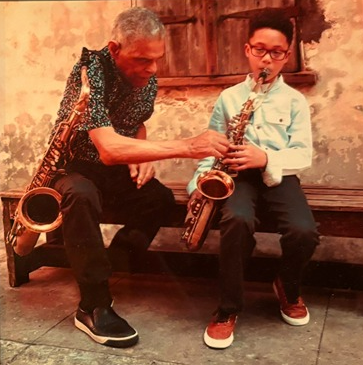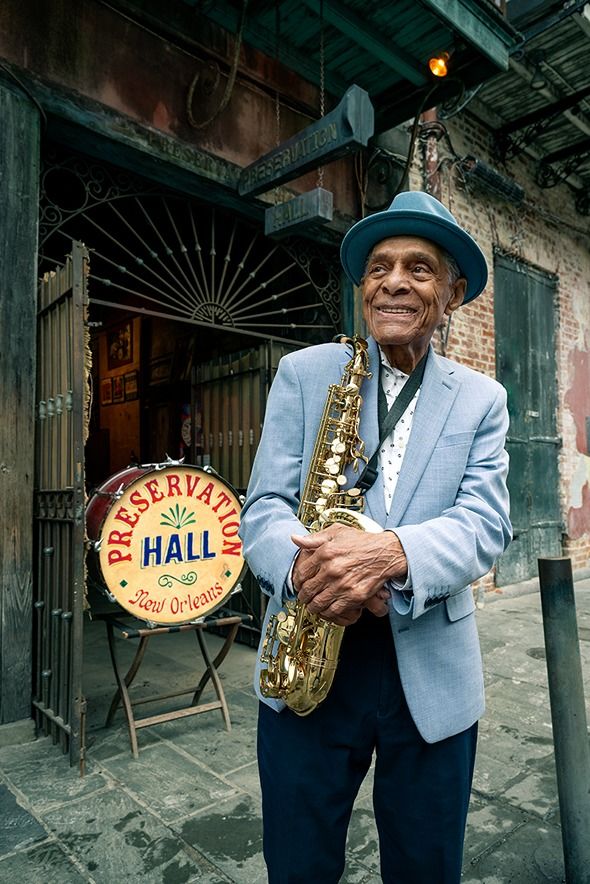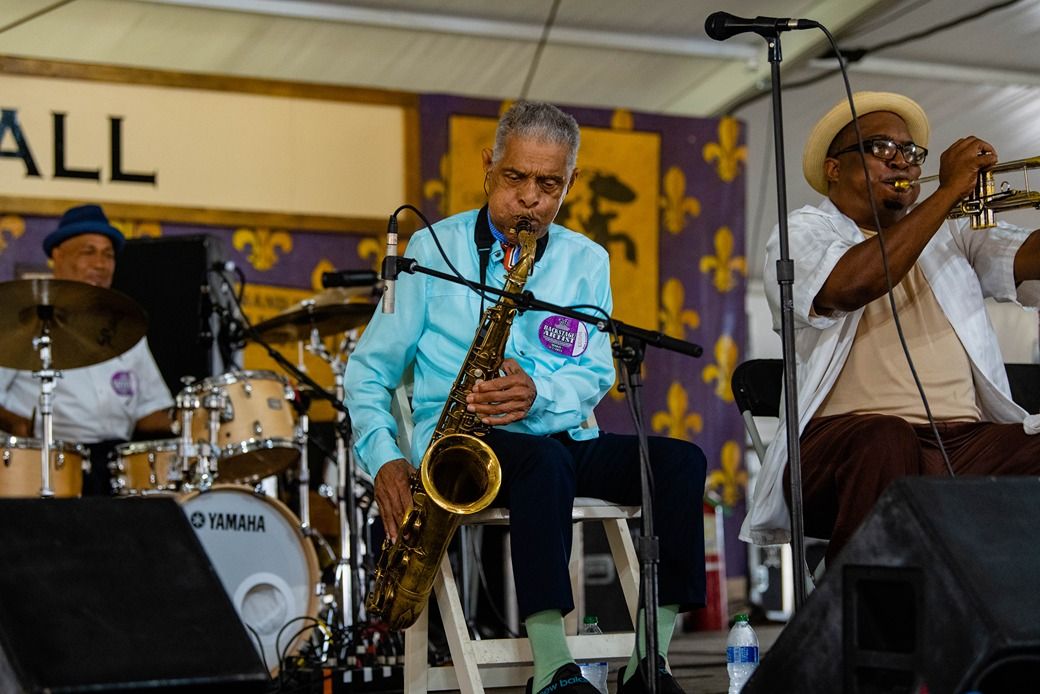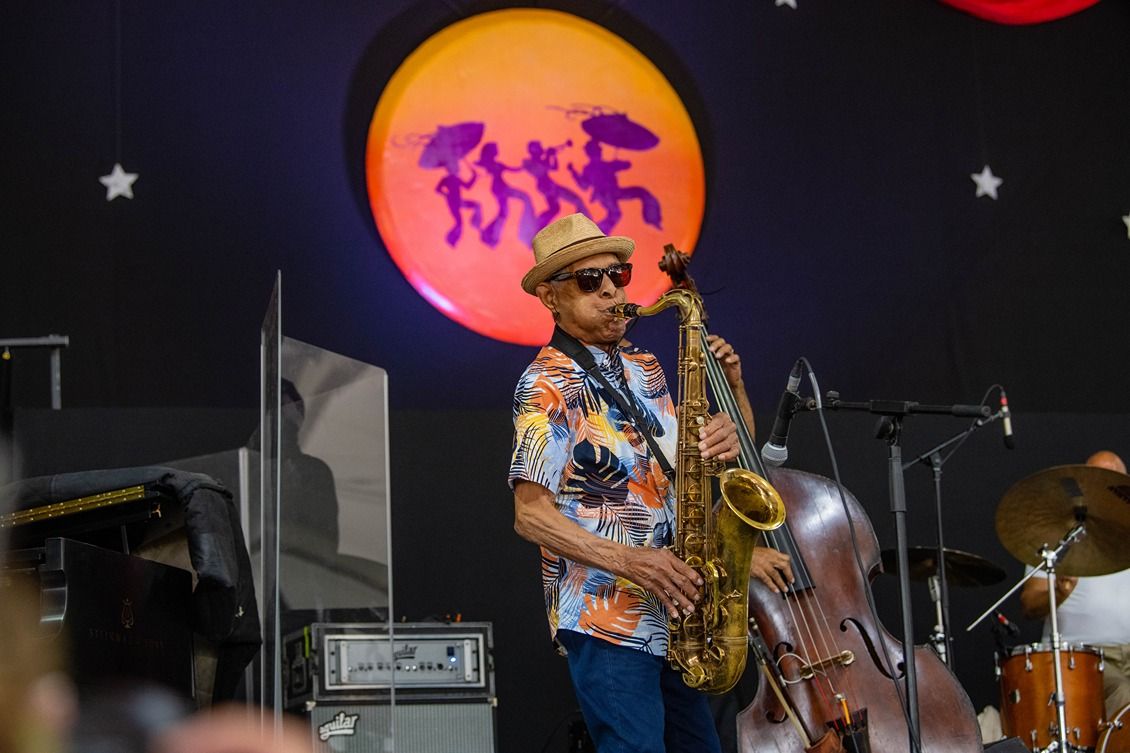Blow, Gabriel, Blow
JAZZ FEST WITH THE PRESERVATION HALL JAZZ BAND, SHELL GENTILLY STAGE | FRIDAY, APRIL 26 | 3:45 P.M.
In 2022, I was the first post-pandemic hire on the events team at Preservation Hall. This meant spending time with dozens of the greatest jazz musicians in the city; meeting lifelong idols, including Robert Plant; being in that historic, sacred place to celebrate birthday parties, weddings, graduations; and, even once, making space for Taylor Swift. But what I hold most dear is the advice I was given by lifelong artists and respected elders from our community, none more beloved than Charlie Gabriel.
If you were raised on music, you may have assumed that "Charlie Gabriel" was a household name, but, if he isn't yet, maybe he'll become your new favorite. Born in 1932, Gabriel has been performing since he was 11-years-old. That's 80 years of bringing music into the world, but Gabriel won't accept the credit. He believes that everyone he's ever played with is a part of his sound. And by that logic, he is also a part of theirs. So even if you don't know if you've heard him, if you've heard Lionel Hampton, the Eureka Brass Band, the Preservation Hall Band, or Aretha Franklin, then you have. He toured and recorded with Aretha Franklin for many years. He's even performed with the Jackson 5, as well as dozens of the greats in his time.
Where Y'at: When you're not performing, what sort of music do you enjoy listening to?
Charlie Gabriel: "Bebop. I'm a jazz musician. Charlie Parker, Dizzy Gillespie, Miles Davis, Oscar Peterson; I listen to jazz songs with good musicians. There's so many. Some of these new young musicians coming up is really good—not surprising. All the stuff is out there for them to learn. Not only is the music out there, they've got books that are written, already, with the lick that this guy did last year."

WY: So the new, young musicians, they're good because they're talented but also because they have so many people and resources to learn from?
CG: "What you learn from, those are your tools. Pay attention, or you'll miss something. You don't want to miss nothin'."
WY: Who did you feel like you learned from?
CG: "You get something different from everybody you play with. Everybody gives you a part of who they are when they play with you. I was in a band with one of the great drummers in the industry, J.C. Heard. I was in his band all over, and he worked with the Cab Calloway band. I've played with all the musicians of that caliber. They all gave me something. I played with the Lionel Hampton band, and I got something from him. I've played with so many big, top jazz musicians over time. They're all a part of how I play."

WY: I'd like to imagine there's another musician sitting in an interview right now saying the same about you.
CG: "Nothing really belongs to you. You borrow it. You develop it and then it becomes a part of who you are. It becomes yours because you do something to it. You give everyone back something that they don't have because they can't be you and you can't be them, but we all share the same thing. I'm an old musician. I've been playing since I'm 11-years-old, and I'm 91 now. That's many, many years. As you become a musician from an early age, you have a little bit of everybody in you because you listen to so many different people. You play with so many people. It's the combination of your experience over a period of years, rather than just what you know, because everybody you play with gives you something as you develop a relationship with them. You give them a part of who you are. I play what I know and I also play what you gave me. You'd be very bold playing just what you know."
WY: How do you remain fluid as a player and open to all the influences?
CG: "Music happens in the moment. You can't know how you're going to feel when you play and you can't feel what you already felt after; it's gone. It may never come back again. But maybe the next feeling will be even better. You react to it neutrally so you can come up with something new and different. There are so many different ways of approaching a particular melody line. One person approaching it one way makes me approach it differently. It's one thing and another thing, but it all becomes the same when it becomes yours. When I play new shows, I step outside my comfort zone and start trying different stuff. That's my practice. That's where I grow."

WY: You come from a whole family of musicians, don't you?
CG: "My dad was a drummer and an alto player. My mother played the saxophone. She showed him the scales, and he was such a good musician, as a drummer, that he was able to improvise and transfer his skills over to the clarinet. He's stopped playing drums 'cause he came down with rheumatism and couldn't carry the drums. He became an alto and clarinet player, and they both taught my older sister saxophone. Everybody in my family played. He taught my brothers [the] trumpet. My older sister became a piano player. We have piano players, guitar players."
WY: Outside of music, you're also a pretty well known chess player.
CG: "I love to play chess. My older brother, many years ago, wanted to teach me how to play and I said, 'Man, I don't have no time to play chess. I'm playing my horn.' And he said, 'Charles, you should learn how to play chess. It will discipline you.' I was even on [the cover of] a chess magazine because, when I was traveling on the road, I'd run into a lot of guys that played chess. They'd be good. Sometimes I'd win. Sometimes I'd lose. Fortunately, I've won more than I've lost. Every challenge is different. It's a beautiful game."
WY: Does your love of chess influence your playing?
CG: "Chess gives you an idea of how to approach a lot of stuff from different individuals that come your way and that have come before you. It's a mind game. It adds to who you are. It gives you discipline. Especially if you decide you want to write your own music, and you get a thought in your mind, then you stay on track 'cause you have a direction. It helps you focus. Music helps too because it makes you think."
WY: Is there any overlap in the worlds of chess and music?
CG: "It's apples and oranges. Chess is a different concept. What you learn from other players, watching their moves, is how to protect your pieces. With music, you don't see what you learn, you feel it. With chess, you're checking one another. I stop you, you stop me, and we have to figure out how to get around each other. Wherever I go, you're gonna try to stop me. In music, there ain't no wrong. It's just [about] how it fits into the melody, how it fits into the song. If it doesn't feel right, don't force it—you'll feel what's right. You can't force music."

WY: What was your most memorable Jazz & Heritage Festival performance?
CG: "I recall doing one with Tony Bennett. That stayed with me. I remember doing a show with Frankie Avalon, Brenda Lee. They were young, young artists at that time—just coming out. And the Jackson 5. I played with them when they was kids. I played with the Aretha Franklin band for a long time. I recorded with them. I traveled with her. You'll see my name on the back of her album. I was Joe Simon's band leader. I've played with them all. I'm old, girl."

